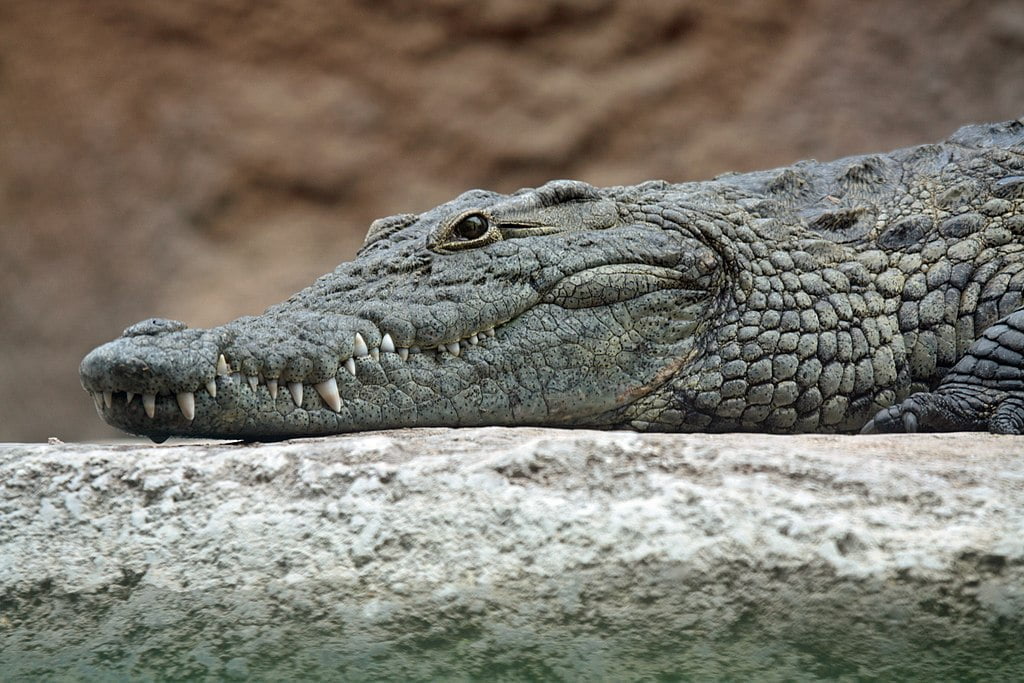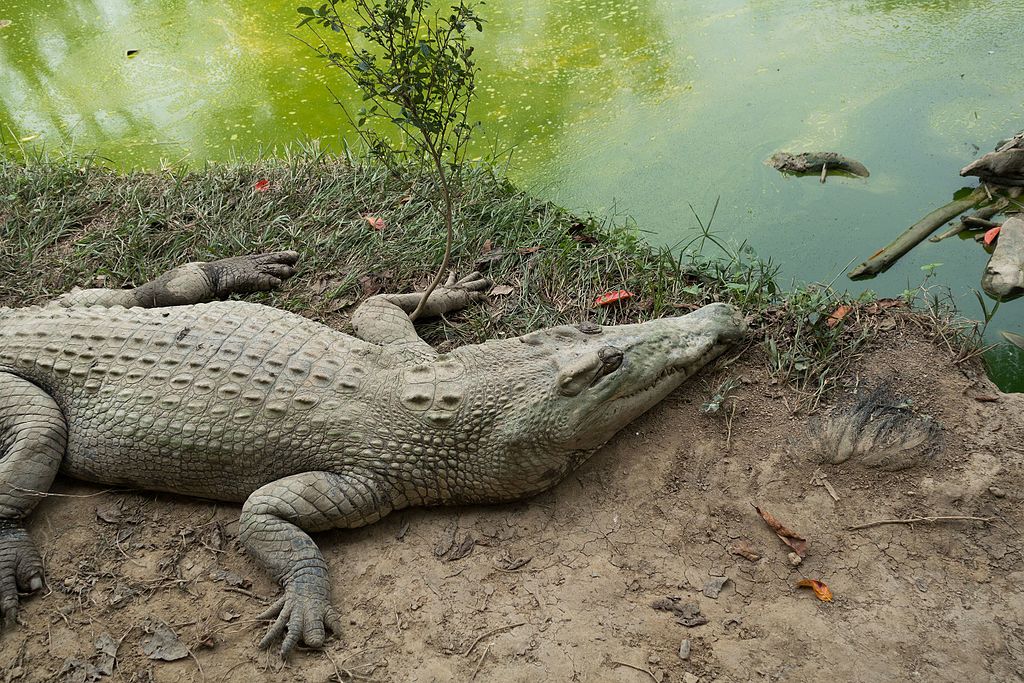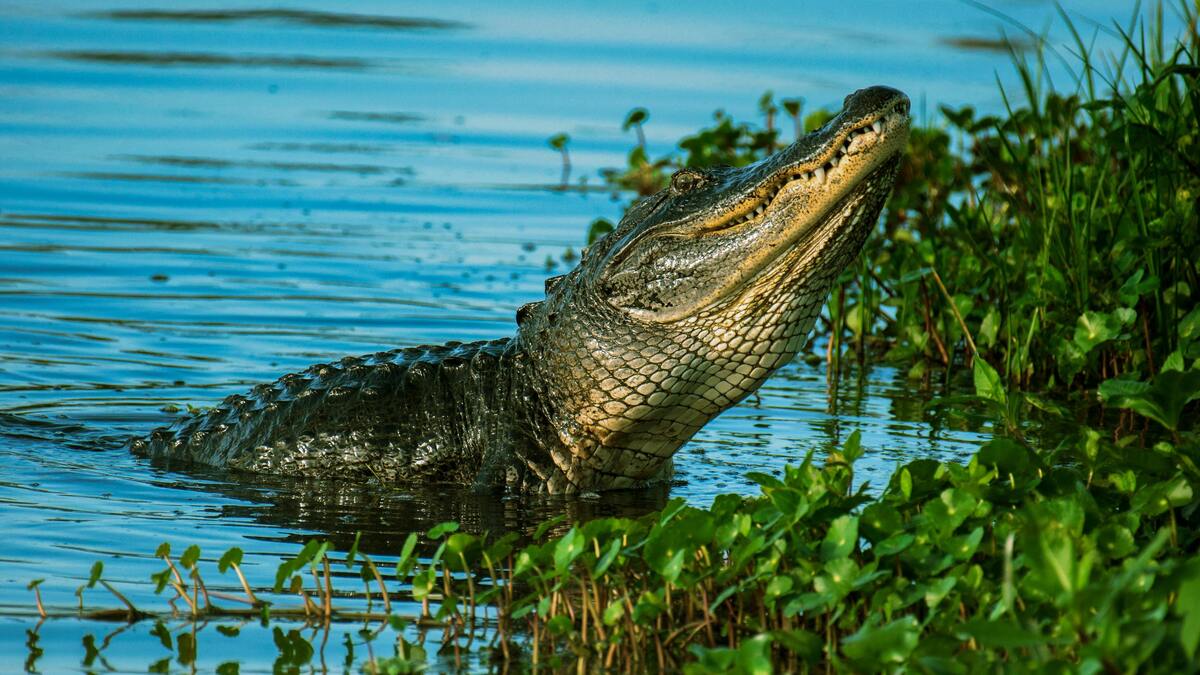As any dinosaur nerd can tell you, the non-avian dinosaurs all died at the end of the Cretaceous when an asteroid struck the Earth around 66 million years ago. There are countless media references to this devastating extinction that wiped out the dinosaurs. But what about the crocodiles? Why did crocodiles survive the dinosaur extinction?
The asteroid impact drove many other clades of animals extinct too, including many aquatic reptiles. You can see my previous article for more on the extinction of these ancient aquatic reptiles.
Many groups of animals, however, survived this extinction event. Curiously, an examination of the groups of animals that survived the asteroid reveals a confusing question.
Although the non-avian dinosaurs went extinct, a similar group of animals survived: the crocodiles. Crocodile survival proves confusing because the crocodiles share many similarities
with the now-extinct, non-avian dinosaurs.
If the end-Cretaceous extinction event drove dinosaurs extinct, how and why did crocodiles survive? Crocodilians may have outlived the dinosaurs due to their lifestyle and physical traits. Crocodilians had slower metabolisms which allowed them to hibernate and consume less food than the dinosaurs.
For a more in-depth explanation, keep reading.
What Are Some Similarities Between Crocodiles and
Dinosaurs?
For this article, I may reference crocodiles when referring to all extant crocodilians including three distinct families: Alligatoridae, Crocodylidae, and Gavialidae. The same concepts apply to them all.
To put this question in context, let’s first discuss the similarities between crocodilians and non-avian dinosaurs. First, crocodiles and non-avian dinosaurs are all reptiles.
This means that, at the very least, they have general similarities in anatomy and physiology as well as appearance. You can get a more in-depth look at this relationship on dinosaurfactsforkids.com.
Like most non-avian dinosaurs, crocodiles also have scaly skin, sharp teeth, and claws. For these reasons, many people have likened crocodiles to be the closest thing to living non-avian dinosaurs on Earth today.

The physical similarities between these groups play into another important factor: crocodiles and many non-avian dinosaurs were fearsome predators. They occupied high positions in their food chains and would therefore have been vulnerable to ripple effects throughout the food chain.
In addition to the above, crocodiles and dinosaurs share an evolutionary heritage, as both are considered archosaurs, members of the subclass Archosauria.
Crocodiles and several other extinct clades are further subdivided into the Pseudosuchia, while dinosaurs, modern birds, pterosaurs, and several other extinct clades are subdivided into the Ornithischia, also known as the Avesuchia or Avemetatarsalia.
For more on the phylogeny of the archosaurs, check out our article on Jurassic Park phylogeny.
In other words, crocodiles are the closest extant relatives of modern birds and the non-avian dinosaurs, but they’re more like distant cousins of the dinosaurs rather than immediate family.
Given these parallels, it makes sense to conclude that these groups should have shared the same fate at the end of the Cretaceous, and yet, they didn’t. Why?
Why Did Crocodiles Survive the Dinosaur Extinction?
There are several hypotheses for why the crocodiles survived the asteroid impact while dinosaurs did not. These range in believability. Some, such as the idea that crocodiles survived because of their short legs and low bodies or greater inherent intelligence than the dinosaurs, seem a little far-fetched.
Other ideas, such as the assertion that crocodiles had better immune systems than dinosaurs, verge on the inane. The fact that dinosaurs survived on Earth for as long as they did implies robust immune systems, and there’s no way to prove or disprove this “hypothesis” anyway. Other proposals, however, about crocodiles’ habitats and biology appear much more likely.
One plausible idea is that the crocodiles’ habitats such as inland rivers, lakes, and deltas, among others, were less heavily impacted by the asteroid impact than the Earth’s oceans. When the asteroid struck the Earth, it devastated the Earth’s oceans.
The result is tsunamis, debris fallout, and disruptions of the oceanic food chains. Inland bodies of water may have simply been more insulated from the immediate effects of the impact.
Crocodiles have proven extremely resilient over their time on Earth. The Natural History Museum website covers their evolutionary arc in greater detail. Here you can learn more about their unique survival traits.
Crocodilian Adaptations Helped Them Outlast the Dinosaurs
In addition to this potential shielding of inland waters, crocodiles may have been better able to respond to changes in their habitats due to their amphibious habits. Because crocodiles inhabit both land and water, they may have simply been better able to adapt to disruptions of either habitat by switching between them and harvesting resources from both as needed.
Crocodiles’ metabolism and body temperature may have also contributed to their survival. Crocodiles are cold-blooded and grow slowly which means that, among other things, they need to eat far less food, because their bodies aren’t constantly burning hundreds of calories to grow and stay warm.
Like dinosaurs, crocodiles consume gastroliths. These are stones that are believed to aid in digestion, though there is some debate on this. Check out our other article on why dinosaurs ate rocks to learn about a few prominent hypotheses.

In the immediate aftermath of the asteroid impact, crocodiles may have found themselves better able to survive due to their lower food requirements whereas the warm-blooded, fast-growing dinosaurs likely could not support their fast metabolisms and therefore starved to death.
Bear in mind that none of these hypotheses are mutually exclusive; it could be that a combination of any number of them contributed to crocodilian survival.
The Crocodilians of Today Did Not Exist with Dinosaurs
While some people call them “living fossils,” this is a misnomer. Crocodilians have evolved into new forms from those that existed 66 million years ago.
The crocodylomorphs of the Mesozoic Era were quite diverse, with some species having adapted to different environments compared to modern crocodiles. Over millions of years of evolution, these ancient relatives of modern crocodiles underwent significant changes in size, shape, and ecological niche.
The crocodiles we see today have evolved from these ancient ancestors and are adapted to their current environments, but they retain many features of their ancient relatives.
Modern crocodiles are not the same as those that lived at the end of the Cretaceous Period. Dinosaurs that survived the extinction changed too.
Did Crocodiles Just Get Lucky?
Despite all the competing hypotheses for why crocodiles survived the End-Cretaceous mass extinction when other organisms didn’t, there’s another important factor at play: chance.

Chance factors heavily in determining which organisms survive and which organisms go extinct. This phenomenon occurs because of the unpredictability of changes to ecosystems and what these changes may entail:
- Does the climate heat up or cool down?
- Does rainfall increase or decrease?
- Does a land bridge form and allow species to spread or is a species cut off on an island and isolated?
- Does a massive storm destroy a species’ nesting ground?
- Does an asteroid strike the Earth’s oceans or land masses?
In every case, some organisms will be better adapted to handle the new environment, and some will go extinct. Which organisms are favored depends on the change itself.
In other words, the crocodiles may not have been better than the dinosaurs, they may have simply gotten lucky. A different extinction event could have driven the crocodiles extinct instead of the non-avian dinosaurs.
You could instead be reading an article titled “Why did the dinosaurs survive the crocodile extinction?” This article cannot fully explain exactly why crocodiles survived but I hope that I provided some good insight as to the prominent hypotheses.
If you have further questions or suggestions for a follow-up article, please let us know in the comments. As always, sharing this article with friends helps us to know which topics are the most interesting to readers.

